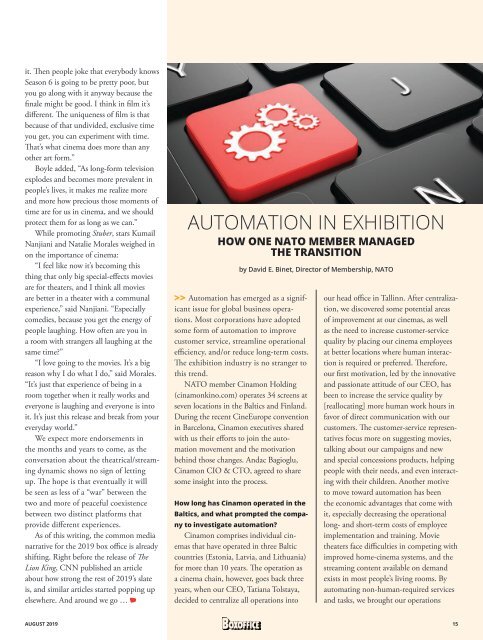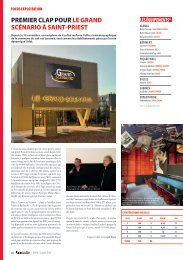Boxoffice - August 2019
The Official Magazine of the National Association of Theatre Owners
The Official Magazine of the National Association of Theatre Owners
Create successful ePaper yourself
Turn your PDF publications into a flip-book with our unique Google optimized e-Paper software.
it. Then people joke that everybody knows<br />
Season 6 is going to be pretty poor, but<br />
you go along with it anyway because the<br />
finale might be good. I think in film it’s<br />
different. The uniqueness of film is that<br />
because of that undivided, exclusive time<br />
you get, you can experiment with time.<br />
That’s what cinema does more than any<br />
other art form.”<br />
Boyle added, “As long-form television<br />
explodes and becomes more prevalent in<br />
people’s lives, it makes me realize more<br />
and more how precious those moments of<br />
time are for us in cinema, and we should<br />
protect them for as long as we can.”<br />
While promoting Stuber, stars Kumail<br />
Nanjiani and Natalie Morales weighed in<br />
on the importance of cinema:<br />
“I feel like now it’s becoming this<br />
thing that only big special-effects movies<br />
are for theaters, and I think all movies<br />
are better in a theater with a communal<br />
experience,” said Nanjiani. “Especially<br />
comedies, because you get the energy of<br />
people laughing. How often are you in<br />
a room with strangers all laughing at the<br />
same time?”<br />
“I love going to the movies. It’s a big<br />
reason why I do what I do,” said Morales.<br />
“It’s just that experience of being in a<br />
room together when it really works and<br />
everyone is laughing and everyone is into<br />
it. It’s just this release and break from your<br />
everyday world.”<br />
We expect more endorsements in<br />
the months and years to come, as the<br />
conversation about the theatrical/streaming<br />
dynamic shows no sign of letting<br />
up. The hope is that eventually it will<br />
be seen as less of a “war” between the<br />
two and more of peaceful coexistence<br />
between two distinct platforms that<br />
provide different experiences.<br />
As of this writing, the common media<br />
narrative for the <strong>2019</strong> box office is already<br />
shifting. Right before the release of The<br />
Lion King, CNN published an article<br />
about how strong the rest of <strong>2019</strong>’s slate<br />
is, and similar articles started popping up<br />
elsewhere. And around we go …<br />
AUTOMATION IN EXHIBITION<br />
HOW ONE NATO MEMBER MANAGED<br />
THE TRANSITION<br />
by David E. Binet, Director of Membership, NATO<br />
>> Automation has emerged as a significant<br />
issue for global business operations.<br />
Most corporations have adopted<br />
some form of automation to improve<br />
customer service, streamline operational<br />
efficiency, and/or reduce long-term costs.<br />
The exhibition industry is no stranger to<br />
this trend.<br />
NATO member Cinamon Holding<br />
(cinamonkino.com) operates 34 screens at<br />
seven locations in the Baltics and Finland.<br />
During the recent CineEurope convention<br />
in Barcelona, Cinamon executives shared<br />
with us their efforts to join the automation<br />
movement and the motivation<br />
behind those changes. Andac Bagioglu,<br />
Cinamon CIO & CTO, agreed to share<br />
some insight into the process.<br />
How long has Cinamon operated in the<br />
Baltics, and what prompted the company<br />
to investigate automation?<br />
Cinamon comprises individual cinemas<br />
that have operated in three Baltic<br />
countries (Estonia, Latvia, and Lithuania)<br />
for more than 10 years. The operation as<br />
a cinema chain, however, goes back three<br />
years, when our CEO, Tatiana Tolstaya,<br />
decided to centralize all operations into<br />
our head office in Tallinn. After centralization,<br />
we discovered some potential areas<br />
of improvement at our cinemas, as well<br />
as the need to increase customer-service<br />
quality by placing our cinema employees<br />
at better locations where human interaction<br />
is required or preferred. Therefore,<br />
our first motivation, led by the innovative<br />
and passionate attitude of our CEO, has<br />
been to increase the service quality by<br />
[reallocating] more human work hours in<br />
favor of direct communication with our<br />
customers. The customer-service representatives<br />
focus more on suggesting movies,<br />
talking about our campaigns and new<br />
and special concessions products, helping<br />
people with their needs, and even interacting<br />
with their children. Another motive<br />
to move toward automation has been<br />
the economic advantages that come with<br />
it, especially decreasing the operational<br />
long- and short-term costs of employee<br />
implementation and training. Movie<br />
theaters face difficulties in competing with<br />
improved home-cinema systems, and the<br />
streaming content available on demand<br />
exists in most people’s living rooms. By<br />
automating non-human-required services<br />
and tasks, we brought our operations<br />
AUGUST <strong>2019</strong><br />
15

















